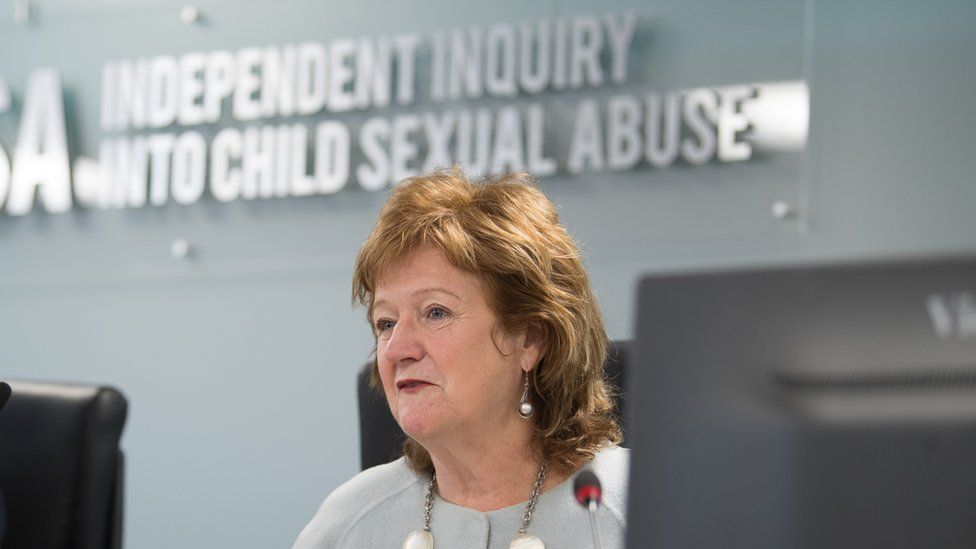
Anyone who works with children and does not report child sexual abuse should be prosecuted, the final report of a huge, seven-year inquiry has recommended.
It called the nature and scale of abuse in England and Wales "horrific and deeply disturbing" with children "threatened, beaten and humiliated".
The inquiry began in 2015 and has cost £186m with evidence from 7,000 victims.
Chairwoman Prof Alexis Jay described an "epidemic that leaves thousands of victims in its poisonous wake".
Prof Jay said some victims would never recover from their experiences.
"We heard time and time again how allegations of abuse were ignored, victims were blamed and institutions prioritised their reputations over the protection of children," she said.
"We cannot simply file it away and consider it a historical aberration when so much of what we learned suggests it is an ever growing problem exacerbated by current and future threat of the internet."
This video can not be played
To play this video you need to enable JavaScript in your browser.

The inquiry: Key facts
The Independent Inquiry into Child Sexual Abuse (IICSA) was set up in the wake of the Jimmy Savile scandal by then Home Secretary Theresa May.
Hundreds of people came forward after the presenter's death in 2011 to say he had abused them as children.
The public inquiry was given a broad remit to investigate historical allegations of child abuse, dating back to the 1950s, as well as claims that authorities, including the police, failed to properly investigate these allegations.
About 7,000 victims of abuse have provided testimonies and 725 people gave evidence over 325 days of public hearings, contributing to 15 investigations and dozens of reports.

"The deviousness and cruelty of perpetrators was limitless," says the report.
It adds that institutions too often "prioritised their personal and institutional reputations above the welfare of those they were duty bound to protect.
"Blame was frequently assigned to the victims who were treated as if they were unworthy of protection."
Some institutions did not respond at all to the inquiry's investigations, whilst others merely offered "insincere apologies and inadequate provision of support and counselling".
The inquiry has been criticised for focusing too much on past events, but IICSA's report said that online abuse had increased in recent years and that there were many lessons for modern organisations to learn.
"Child protection must be given a much greater priority in public life," it concludes.
The inquiry says its 20 key recommendations need to be accepted by government as a "matter of urgency".
These include a new law placing a duty to report child abuse on anyone who witnessed it or was told about it by children or perpetrators.
Not doing so would result in a criminal offence unless the behaviour was consensual and non-abusive between young people of similar ages.
This would cover "anyone working with children", an inquiry official said, as defined under the Sexual Offences Act 2003.
There is currently no legal, criminal requirement to report child sexual abuse, although people may be required to under the terms of their employment or codes of conduct. Wales has a statutory duty to report but no sanction for not doing so.
The recommendation of mandatory reporting, will be widely welcomed by campaigners who say it is critical to preventing institutions covering up abuse to protect their reputations.
The inquiry also argues for new child protection authorities for England and Wales - and a new, single scheme for compensating victims of abuse.
It dismissed concerns that victims might "lie for money" as "misplaced and offensive" and said victims found current legal systems "hostile, baffling and futile" and often gave up trying to claim.
The inquiry demanded that the government require providers of internet search services and social networks to pre screen material for child abuse, before it is uploaded.
The inquiry's final, over-arching report was published on Thursday. It has already published reports highlighting the scale of abuse across a range of institutions, including religious organisations, politics, children's homes and schools.
It also highlights "undue deference of police, prosecutors and political parties" towards prominent individuals accused of abuse.
The Roman Catholic church presided over a "sorry history of child sexual abuse where abusive priests and members of religious orders preyed on children for prolonged periods of time", says the report.
Between 1970 and 2015, there were 3,000 complaints and 133 convictions. Millions were paid in compensation to victims.
In the Church of England there were 390 convictions dating back to the 1940s.
In other religions there had been "significant barriers to effective reporting of child sexual abuse, including victim blaming and notions of shame and honour."
The inquiry examined claims of abuse at children's homes including, Cambridge House and Knowl View, in Rochdale.
In Nottinghamshire children's homes there were 350 complainants about abuse by staff.
Another massive abuse scandal centred on Lambeth Council in south London where the inquiry said it was "hard to comprehend the cruelty and sexual abuse inflicted on children".
The inquiry has identified particular concerns about boarding schools and some specialist schools, such as those teaching music and highlights "deeply distressing cases" where the school's was seen as more important than victims.
When the inquiry began there were fervent rumours that a "Westminster paedophile ring" had abused children. IICSA uncovered no evidence of that, despite finding many "individual perpetrators".
https://news.google.com/__i/rss/rd/articles/CBMiJmh0dHBzOi8vd3d3LmJiYy5jby51ay9uZXdzL3VrLTYzMzE4MzQy0gEqaHR0cHM6Ly93d3cuYmJjLmNvLnVrL25ld3MvdWstNjMzMTgzNDIuYW1w?oc=5
2022-10-20 11:01:48Z
1612018394
Tidak ada komentar:
Posting Komentar